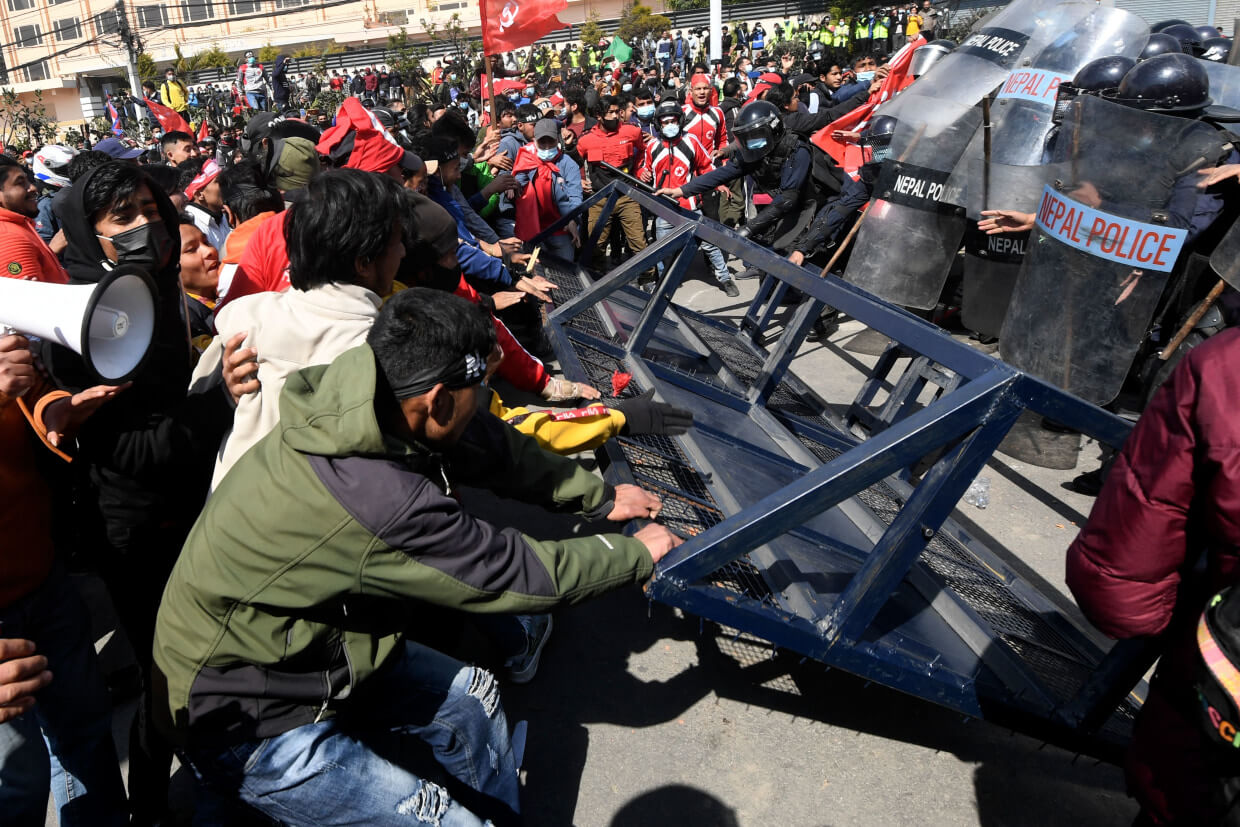On Sunday, Nepalese police used tear gas to disperse hundreds of protestors who were gathered outside the Parliament in Kathmandu to demonstrate against American aid agency Millennium Challenge Corporation’s (MCC) $500 million grant for infrastructure projects in the country.
The demonstrators tried to push back against the barricades and pelted stones at the security forces. In response, the riot police deployed water cannons, rubber bullets, tear gas, and used batons to drive them away. Local media reported injuries on both sides.
The MCC was set up by the US in 2004 to provide assistance and support to low and middle-income countries. In 2017, the MCC approved a $500 million grant to fund infrastructure projects in Nepal, including power transmission lines and roads. However, the project is yet to be ratified by the Nepalese government, which has continued to ask for extensions since 2019; the most recent extension was approved in September 2021 and is slated to end on February 28.
Different political party's cadres clash with police during the protest against Millennium Challenge Corporation (MCC) grants by US government for Nepal, which is table to Legislative assembly for the ratification, on Sunday Feb.20. pic.twitter.com/PXZSZt1C6E
— Angad Dhakal (@AngadDhakal) February 20, 2022
The grant has generated widespread criticism from the opposition parties along with members of the ruling coalition of the country. Political resistance to the MCC proposal is led by the country’s communist parties, who believe that the grant’s terms are unfair to Kathmandu. They argue that it attempts to undermine Nepal’s sovereignty by superseding domestic laws, asserting that the infrastructure projects are a part of the US Indo-Pacific Strategy and could result in US military presence in the country.
Against this tense backdrop, Minister for Communication and Information Technology Gyanendra Bahadur Karki presented the agreement in the Parliament on Sunday, claiming that the project would benefit 24 million citizens by constructing around 300 kilometres of 420 kV transmission lines. He stressed that the government would not allow the MCC to supersede the country’s constitution, adding that the government remains fully committed to Nepal’s sovereignty and independence.
Discussions on the agreement are expected to go on for several days before facing a vote before the Parliament. However, the deal’s future remains uncertain, given that there is opposition even within the ruling coalition; the Communist Party of Nepal (Maoist Centre) and Communist Party of Nepal (Unified Socialist) have both objected to the grant. In fact, as the Parliament discussed the agreement, both parties deployed their student wings to participate in anti-MCC protests. This has forced Prime Minister Sher Bahadur Deuba to turn to his main opposition—the Communist Party of Nepal (Unified Marxist–Leninist) (CPN-UML)—to gather support for the project in order to avoid conflict with the US.
Speaking about the lack of support for the grant within the ruling coalition, Prakash Sharan Mahat, the spokesperson for the Nepali Congress Party, said, “Although they agreed to present the agreement in the Parliament, it’s still not clear whether all coalition partners will cast their vote in favour… Our efforts will continue to convince them.” He further expressed hope that the ruling coalition members would recognise the intent of the MCC agreement and eventually support it.
The US has previously blamed China for sponsoring a disinformation campaign against the project. According to a State Department spokesperson quoted by Hindustan Times, China has “actively fomented or encouraged or funded or facilitated” false information surrounding the $500 million grant. To this end, the US has opined that it would be “deeply disappointing” if “outside influence and corruption” resulted in the failure of these projects.
Meanwhile, China has vocally opposed the grant and its prospective impact on Nepal’s sovereignty. While addressing a media briefing last Friday, Chinese foreign ministry spokesperson Wang Wenbin said, “We oppose coercive diplomacy and actions that pursue selfish agendas at the expense of Nepal’s sovereignty and interests.” He added that any such development and infrastructure assistance should “come with no strings attached.”

